英语四级考试词汇与语法精讲
- 格式:doc
- 大小:368.50 KB
- 文档页数:66


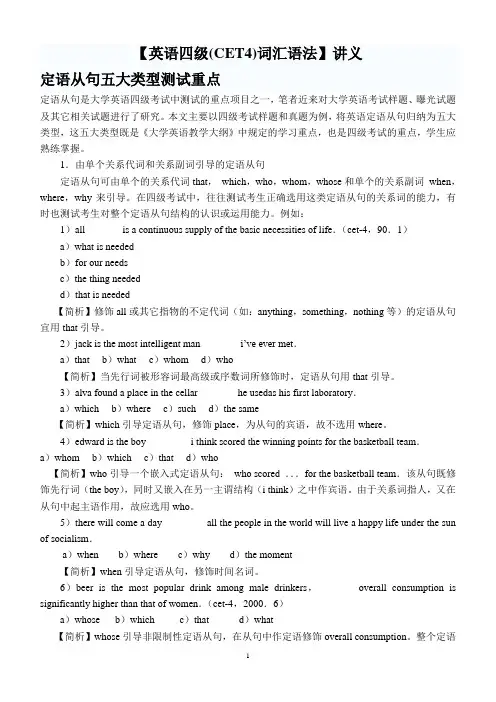
【英语四级(CET4)词汇语法】讲义定语从句五大类型测试重点定语从句是大学英语四级考试中测试的重点项目之一,笔者近来对大学英语考试样题、曝光试题及其它相关试题进行了研究。
本文主要以四级考试样题和真题为例,将英语定语从句归纳为五大类型,这五大类型既是《大学英语教学大纲》中规定的学习重点,也是四级考试的重点,学生应熟练掌握。
1.由单个关系代词和关系副词引导的定语从句定语从句可由单个的关系代词that,which,who,whom,whose和单个的关系副词when,where,why来引导。
在四级考试中,往往测试考生正确选用这类定语从句的关系词的能力,有时也测试考生对整个定语从句结构的认识或运用能力。
例如:1)all _____ is a continuous supply of the basic necessities of life.(cet-4,90.1)a)what is neededb)for our needsc)the thing neededd)that is needed【简析】修饰all或其它指物的不定代词(如:anything,something,nothing等)的定语从句宜用that引导。
2)jack is the most intelligent man _____ i’ve ever met.a)that b)what c)whom d)who【简析】当先行词被形容词最高级或序数词所修饰时,定语从句用that引导。
3)alva found a place in the cellar _____ he usedas his first laboratory.a)which b)where c)such d)the same【简析】which引导定语从句,修饰place,为从句的宾语,故不选用where。
4)edward is the boy _____ i think scored the winning points for the basketball team.a)whom b)which c)that d)who【简析】who引导一个嵌入式定语从句:who scored ...for the basketball team.该从句既修饰先行词(the boy),同时又嵌入在另一主谓结构(i think)之中作宾语。
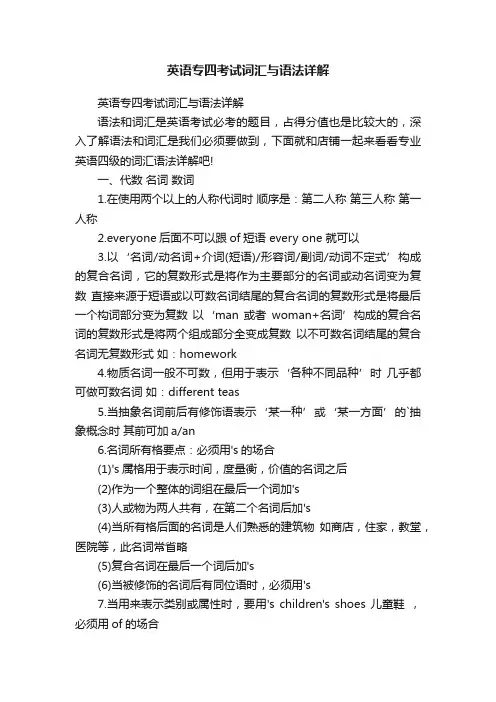
英语专四考试词汇与语法详解英语专四考试词汇与语法详解语法和词汇是英语考试必考的题目,占得分值也是比较大的,深入了解语法和词汇是我们必须要做到,下面就和店铺一起来看看专业英语四级的词汇语法详解吧!一、代数名词数词1.在使用两个以上的人称代词时顺序是:第二人称第三人称第一人称2.everyone后面不可以跟of短语 every one 就可以3.以‘名词/动名词+介词(短语)/形容词/副词/动词不定式’构成的复合名词,它的复数形式是将作为主要部分的名词或动名词变为复数直接来源于短语或以可数名词结尾的复合名词的复数形式是将最后一个构词部分变为复数以‘man 或者woman+名词’构成的复合名词的复数形式是将两个组成部分全变成复数以不可数名词结尾的复合名词无复数形式如:homework4.物质名词一般不可数,但用于表示‘各种不同品种’时几乎都可做可数名词如:different teas5.当抽象名词前后有修饰语表示‘某一种’或‘某一方面’的`抽象概念时其前可加a/an6.名词所有格要点:必须用's的场合(1)'s属格用于表示时间,度量衡,价值的名词之后(2)作为一个整体的词组在最后一个词加's(3)人或物为两人共有,在第二个名词后加's(4)当所有格后面的名词是人们熟悉的建筑物如商店,住家,教堂,医院等,此名词常省略(5)复合名词在最后一个词后加's(6)当被修饰的名词后有同位语时,必须用's7.当用来表示类别或属性时,要用's children's shoes 儿童鞋,必须用of的场合(1)名词后跟有后置修饰语或同位语时(2)以定冠词加分词或形容词表示一类人时如果dozen/score/hundred/thousand/million前有基数词以表示确切数目时,都不能用复数形式如果用来表示很多有不确切的数目时,须用复数,而且后面加of8.表示顺序的两种方式:(1)'名词+基数词',不用冠词,如Chapter four(2)' the+序数词+名词' 如the Fourth Chapter9.倍数增减的表示法(1) 倍数+形容词/副词比较级+than(2) 倍数+as+形容词/副词+as(3) 倍数+名词(4) 动词+百分比或倍数(5) 动词+to+数词(6) double/triple/quadruple+名词(7) 动词+by+数词/百分比/倍数10.分数分子为基数词,分母为序数词分母除了在分子为一的其他情况下为复数11.百分比后接名词时加of二、形容词副词(1)前置修饰语的排列顺序可以至于冠词前的形容词(all both such) -----冠词,指示形容词,所有格形容词,不定形容词(a an the this your his any some)-----------基数词(one ) 序数词(first)------------ 表示性质,状态,质量的形容词(good useful)--------------表示大小,长短,形状的形容词----------------表示年龄,新旧,温度的形容词------------表示颜色的形容词---------------------表示国籍,产地,区域的形容词-----------表示材料,用做形容词的名词----------动名词,分词(2)后置修饰语由前缀a-构成的形容词(3)形容词修饰由some-,any-,every-,no-,-body,-one,-thing等组成的复合不定代词时,必须后置(4)enough作形容词修饰名词时既可放前又可放后,但当它作副词修饰形容词或副词时,必须后置(5)有些形容词本身就有’比…年长‘,’比…… 优等的意思这些形容词后面用介词to 而不用than(6)much too 作为副词短语修饰形容词或副词,不修饰名词(7)more 不能用来修饰比较级(8)与名词连用的more of a …/as much of a…/more of a…意为更像…(9)as much o f a…意为称得上,less of a 意为算不上(10)none other than(不是别人,正是)=no other than(11)any/some/every与other连用时,其后若用可数名词,一般为单数三、情态动词(1)can 用于否定句cannot(help)but表示不能不,只能(but后跟不带to的动词不定式)(2)must 表示禁止,一定不要时的否定式为mustn't 当它表示有把握的推断时意为一定准是时它的否定形式为can't(3)need doing=need to be done 这个句型表示被动意味(4)need not have done sth 表示本来没有必要做某事 (经常考)四、虚拟语气从句主句(1)与过去事实相反 had+过去分词 should(第一人称)would(其它人称)+have+过去分词与现在事实相反一般过去式(动词be用were) would/should/could/might+动词原型与将来事实相反过去式或should/were+动原would/should/could/might+动词原型(2)It is (high/about/the)time……谓语动词用过去式指现在或将来的情况表示早该做某事而现在已经有点晚了(3)It is the first(second/third)time后的that从句中,谓语动词要用完成体来表示一种经验(4)as if/though 的虚拟要点(5)对当时事实的假设,从句谓语用过去式,be动词一律用were(6)对过去事实的假设,从句谓语用过去完成式(7)对未来事实的假设,从句谓语用would+动词原型【英语专四考试词汇与语法详解】。
![最新[英语考试]英语专业四级考试 语法词汇知识幻灯片课件](https://uimg.taocdn.com/4b246e063186bceb18e8bbb7.webp)
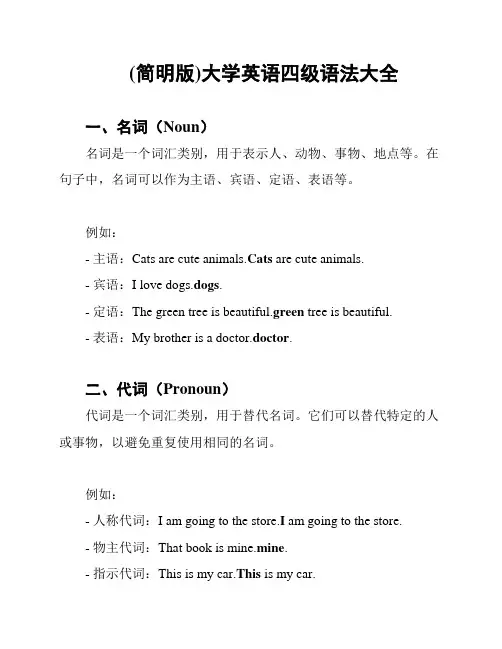
(简明版)大学英语四级语法大全一、名词(Noun)名词是一个词汇类别,用于表示人、动物、事物、地点等。
在句子中,名词可以作为主语、宾语、定语、表语等。
例如:- 主语:Cats are cute animals.Cats are cute animals.- 宾语:I love dogs.dogs.- 定语:The green tree is beautiful.green tree is beautiful.- 表语:My brother is a doctor.doctor.二、代词(Pronoun)代词是一个词汇类别,用于替代名词。
它们可以替代特定的人或事物,以避免重复使用相同的名词。
例如:- 人称代词:I am going to the store.I am going to the store.- 物主代词:That book is mine.mine.- 指示代词:This is my car.This is my car.- 相互代词:They saw each other at the party.each other at the party.三、形容词(Adjective)形容词是用于描述名词或代词的词汇。
它们可以提供关于名词或代词的特征、性质、状态等信息。
例如:- 描述名词:She has a beautiful voice.beautiful voice.- 描述代词:I am so tired.so tired.- 修饰词组:He bought a red sports car.red sports car.四、副词(Adverb)副词是用于描述动词、形容词、其他副词或整个句子的词汇。
它们可以提供关于时间、地点、程度等信息。
例如:- 描述动词:She sings beautifully.beautifully.- 描述形容词:He is extremely tall.extremely tall.- 描述副词:She runs very fast.very fast.- 描述整个句子:Certainly, I can help you.Certainly, I can help you.五、动词(Verb)动词是用于表示动作、状态或发生事件的词汇。
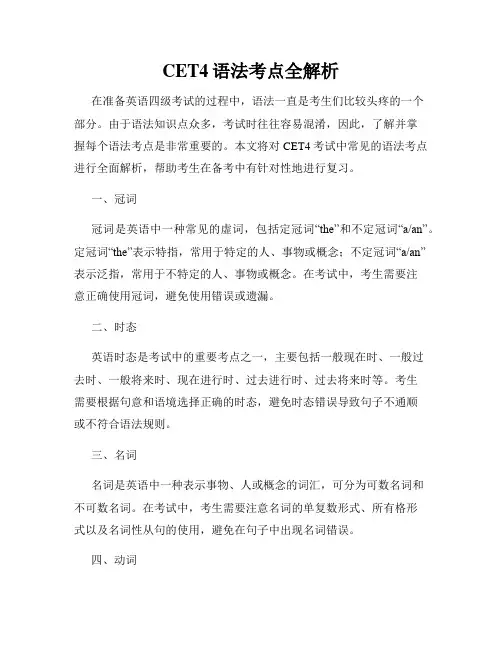
CET4语法考点全解析在准备英语四级考试的过程中,语法一直是考生们比较头疼的一个部分。
由于语法知识点众多,考试时往往容易混淆,因此,了解并掌握每个语法考点是非常重要的。
本文将对CET4考试中常见的语法考点进行全面解析,帮助考生在备考中有针对性地进行复习。
一、冠词冠词是英语中一种常见的虚词,包括定冠词“the”和不定冠词“a/an”。
定冠词“the”表示特指,常用于特定的人、事物或概念;不定冠词“a/an”表示泛指,常用于不特定的人、事物或概念。
在考试中,考生需要注意正确使用冠词,避免使用错误或遗漏。
二、时态英语时态是考试中的重要考点之一,主要包括一般现在时、一般过去时、一般将来时、现在进行时、过去进行时、过去将来时等。
考生需要根据句意和语境选择正确的时态,避免时态错误导致句子不通顺或不符合语法规则。
三、名词名词是英语中一种表示事物、人或概念的词汇,可分为可数名词和不可数名词。
在考试中,考生需要注意名词的单复数形式、所有格形式以及名词性从句的使用,避免在句子中出现名词错误。
四、动词动词是英语中一种表示行为或状态的词汇,主要包括一般动词、情态动词、动词的时态和语态等。
在考试中,考生需要注意动词的时态和语态的正确使用,避免主谓不一致或动词形式错误。
五、代词代词是英语中一种用来代替名词或其他词汇的词汇,包括人称代词、物主代词、反身代词等。
在考试中,考生需要注意代词的正确使用,避免在句子中出现代词错误或误解。
六、连接词连接词是英语中一种用来连接句子、短语或词汇的词汇,包括并列连词、从属连词和连接副词等。
在考试中,考生需要注意连接词的使用,保持句子逻辑性和通顺性。
七、介词介词是英语中一种用来表示位置、方向或关系的词汇,包括时间介词、地点介词和方式介词等。
在考试中,考生需要注意介词的正确使用,避免在句子中出现介词错误或误解。
总结:通过上述对CET4语法考点的全面解析,考生可以更好地理解和掌握英语语法知识,提高语法水平和应试能力。
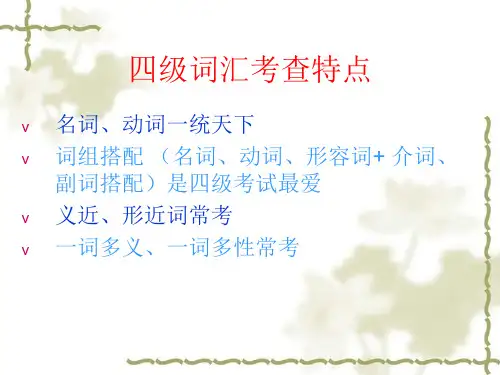
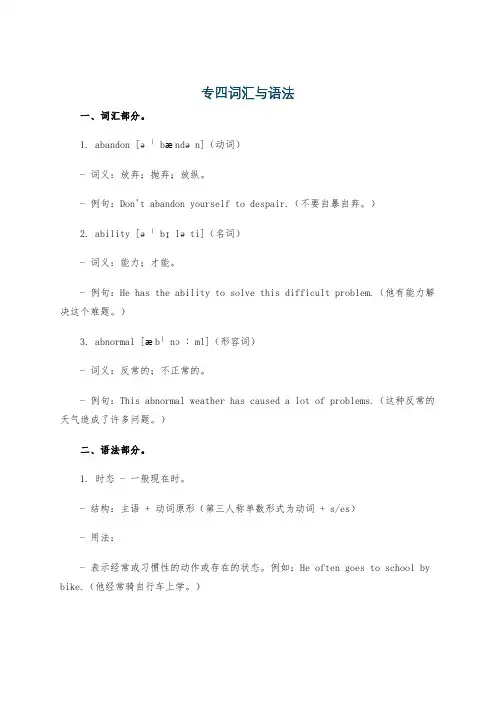
专四词汇与语法一、词汇部分。
1. abandon [əˈbændən](动词)- 词义:放弃;抛弃;放纵。
- 例句:Don't abandon yourself to despair.(不要自暴自弃。
)2. ability [əˈbɪləti](名词)- 词义:能力;才能。
- 例句:He has the ability to solve this difficult problem.(他有能力解决这个难题。
)3. abnormal [æbˈnɔːml](形容词)- 词义:反常的;不正常的。
- 例句:This abnormal weather has caused a lot of problems.(这种反常的天气造成了许多问题。
)二、语法部分。
1. 时态 - 一般现在时。
- 结构:主语 + 动词原形(第三人称单数形式为动词 + s/es)- 用法:- 表示经常或习惯性的动作或存在的状态。
例如:He often goes to school by bike.(他经常骑自行车上学。
)- 表示客观事实或普遍真理。
例如:The earth moves around the sun.(地球绕着太阳转。
)2. 名词的数 - 可数名词复数形式。
- 规则变化:- 一般情况加 -s,如book - books。
- 以s, x, ch, sh结尾的加 -es,如box - boxes。
- 以辅音字母 + y结尾的,变y为i加 -es,如city - cities。
- 不规则变化:- 如man - men,woman - women,child - children等。
3. 形容词和副词的比较级和最高级。
- 规则变化:- 单音节词和部分双音节词:- 一般情况加 -er(比较级)和 -est(最高级),如tall - taller - tallest。
- 以e结尾的加 -r和 -st,如nice - nicer - nicest。
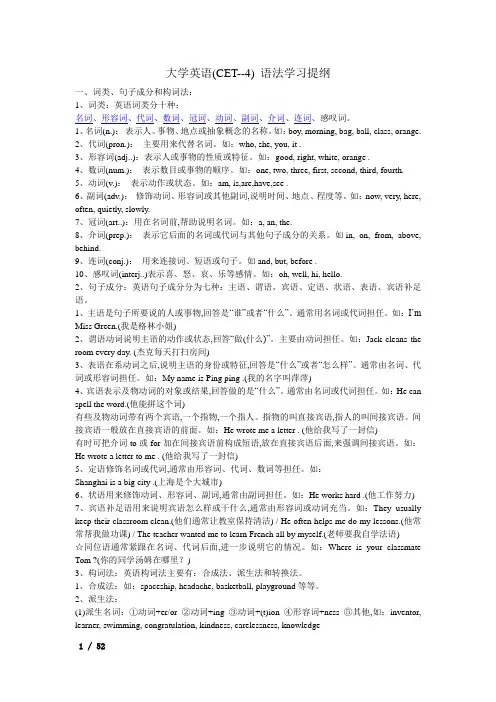
大学英语(CET--4) 语法学习提纲一、词类、句子成分和构词法:1、词类:英语词类分十种:名词、形容词、代词、数词、冠词、动词、副词、介词、连词、感叹词。
1、名词(n.):表示人、事物、地点或抽象概念的名称。
如:boy, morning, bag, ball, class, orange.2、代词(pron.):主要用来代替名词。
如:who, she, you, it .3、形容词(adj..):表示人或事物的性质或特征。
如:good, right, white, orange .4、数词(num.):表示数目或事物的顺序。
如:one, two, three, first, second, third, fourth.5、动词(v.):表示动作或状态。
如:am, is,are,have,see .6、副词(adv.):修饰动词、形容词或其他副词,说明时间、地点、程度等。
如:now, very, here, often, quietly, slowly.7、冠词(art..):用在名词前,帮助说明名词。
如:a, an, the.8、介词(prep.):表示它后面的名词或代词与其他句子成分的关系。
如in, on, from, above, behind.9、连词(conj.):用来连接词、短语或句子。
如and, but, before .10、感叹词(interj..)表示喜、怒、哀、乐等感情。
如:oh, well, hi, hello.2、句子成分:英语句子成分分为七种:主语、谓语、宾语、定语、状语、表语、宾语补足语。
1、主语是句子所要说的人或事物,回答是“谁”或者“什么”。
通常用名词或代词担任。
如:I’m Miss Green.(我是格林小姐)2、谓语动词说明主语的动作或状态,回答“做(什么)”。
主要由动词担任。
如:Jack cleans the room every day. (杰克每天打扫房间)3、表语在系动词之后,说明主语的身份或特征,回答是“什么”或者“怎么样”。
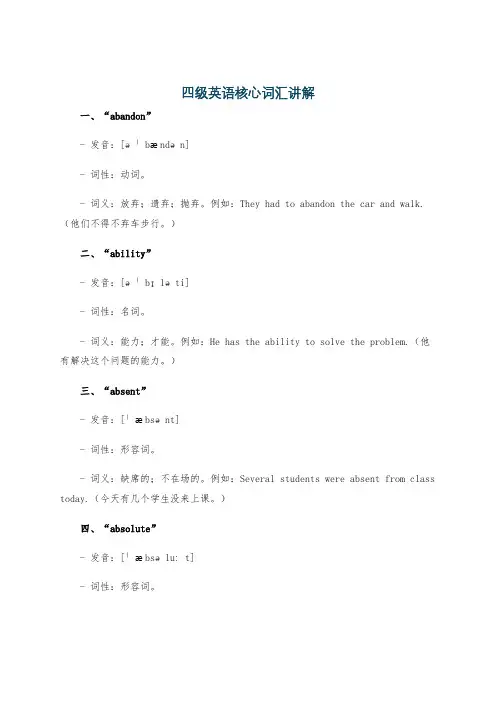
四级英语核心词汇讲解一、“abandon”- 发音:[əˈbændən]- 词性:动词。
- 词义:放弃;遗弃;抛弃。
例如:They had to abandon the car and walk.(他们不得不弃车步行。
)二、“ability”- 发音:[əˈbɪləti]- 词性:名词。
- 词义:能力;才能。
例如:He has the ability to solve the problem.(他有解决这个问题的能力。
)三、“absent”- 发音:[ˈæbsənt]- 词性:形容词。
- 词义:缺席的;不在场的。
例如:Several students were absent from class today.(今天有几个学生没来上课。
)四、“absolute”- 发音:[ˈæbsəluːt]- 词性:形容词。
- 词义:绝对的;完全的。
例如:There is no absolute standard for beauty.(美没有绝对的标准。
)五、“absorb”- 发音:[əbˈzɔːb]- 词性:动词。
- 词义:吸收;吸引;使专心。
例如:Plants absorb carbon dioxide.(植物吸收二氧化碳。
)六、“abstract”- 发音:[ˈæbstrækt](形容词);[æbˈstrækt](动词)- 词性:形容词和动词。
- 词义(形容词):抽象的;理论上的。
例如:Abstract art is not to everyone's taste.(抽象艺术并非人人都能欣赏。
)- 词义(动词):提取;抽取;做…的摘要。
例如:You should abstract the main ideas from the passage.(你应该从文章中提炼出主要观点。
)七、“abundant”- 发音:[əˈbʌndənt]- 词性:形容词。
英语四级词汇考点精讲一、选词填空在英语四级考试中,选词填空是一个常见的考题形式。
这种题型要求考生从括号内选择一个恰当的单词或短语填入空白处,使句子完整、通顺。
下面列举几个常见的考点和解题技巧。
1. 词义辨析在选词填空题中,常常需要考生准确辨析不同单词的意义。
比如:The new computer is much _______(faster, slower) than the old one.解析:根据句子的意思,应选择比较级,所以应选" faster"。
2. 词性转换有时候,需要考生对单词进行词性转换。
例如:I can _______( hard) remember his name.解析:根据句子结构,要用形容词作为补语,所以应选择"hard"的形容词形式“hardly”。
3. 上下文逻辑考生还需要根据上下文逻辑关系来判断选词。
例如:His speech was so ______(boring, boringly) that many people fell asleep.解析:根据上下文逻辑关系,要选形容词,所以应选择"boring"。
在英语四级考试中,词汇搭配也是一个重要的考点。
考生需要掌握词汇的正确搭配用法,才能在考试中准确地回答相关的题目。
下面列举一些常见的词汇搭配。
1. 动词+名词搭配- take a _______(bath, bathe)- make a _______(decision, decide)- have a _______(rest, rest)2. 形容词+名词搭配- a _______(beautiful, beauty) girl- a _______(big, size) house- a _______(red, color) car三、同义词替换英语四级考试中,同义词替换也是一个经常出现的考点。
英语四级考试语法结构与词汇一、语法结构部分。
1. 时态。
- 一般现在时。
- 用法:表示经常发生的动作、存在的状态或客观事实。
- 结构:主语 + 动词原形(第三人称单数主语时动词加 -s或 -es)。
例如:I play football every Sunday.(play,动词原形,[pleɪ])He plays football every Sunday.(plays,动词第三人称单数形式,[pleɪz])- 一般过去时。
- 用法:表示过去某个时间发生的动作或存在的状态。
- 结构:主语+动词的过去式。
例如:I saw a movie yesterday.(saw,see的过去式,[sɔː],动词)- 现在进行时。
- 用法:表示现在正在进行的动作。
- 结构:主语+be动词(am/is/are)+动词的 -ing形式。
例如:She is reading a book.(is,be动词第三人称单数形式,[ɪz];reading,动词的 -ing形式,['ri ːdɪŋ])- 过去进行时。
- 用法:表示过去某个时刻正在进行的动作。
- 结构:主语+be动词(was/were)+动词的 -ing形式。
例如:He was watching TV at 8 o'clock last night.(was,be动词第一、三人称单数过去式,[wɒz];watching,动词的 -ing形式,['wɒtʃɪŋ])2. 从句。
- 定语从句。
- 概念:在句中作定语,修饰名词或代词。
- 关系代词:who(指人,主格,[huː]),whom(指人,宾格,[huːm]),which(指物,[wɪtʃ]),that(指人或物,[ðæt])。
例如:The boy who/that is standing there is my brother.(这里who/that引导定语从句修饰the boy)- 名词性从句。
CET大学英语四级语法精要大学英语四级语法精要Ⅰ动词(时态,语态,用法,省略,一致性等)1.时态1)现在完成进行时态(have/has been+-ing分词构成):动作或状态从过去某时开始,继续到现在,可能继续下去,也可能刚刚结束.I’ve been writing letters for an hour.I’ve been sitting in the garden.2)过去完成进行时(由had been+ing分词构成):过去某个时刻以前一直在进行的动作I’d been working for some time when he called.We had been waiting for her for two hours by the time she came.3)将来完成进行时:将来某个时刻以前一直在进行的动作.By next summer,he will have been working here for twenty years.In another month’s time she’ll have been studying here for three years.4)将来完成时(由shall/will have+过去分词构成):将来某时会业已发生的事.I shall have finished this one before lunch.They’ll have hit the year’s target by the end of October.2.语态1)可以有两种被动结构的类型,例如:He was said to be jealous of her success.It was said that he was jealous of her success.能同时适用于上述两个句型的主动词通常都是表示“估计”,“相信”等意义的动词,常见的有assume,believe,expect,fear,feel,know,presume,report,say,suppose,understand等.It is supposed that the ship has been sunk.The ship is supposed to have been sunk.担当be supposed to与不定式的一般形式搭配时往往表示不同的意义.例如:Why are you driving so fast in this area?You are supposed to know the speed to know the speed limit.(你应该晓得速度限制)2)双宾语及宾补结构的被动语态a)双宾语结构的被动语态:双宾语结构变为被动语态时,可以把主动结构中的一个宾语变为主语,另一个宾语仍然保留在谓语后面,但多数是把间接宾语变为主语.He was asked a number of questions at the press conference.Two days were allowed them for making the necessary preparations.b)宾补结构的被动语态:She was called Big Sister by everybody.Then he was made a squad leader.He was considered quite qualified for the job.The room was always kept clean and tidy.3.短语动词1)Vi+advThe plane took off two hours late.2)Vi+prepThey looked round the Cathedral.3)Vi+prep(有被动语态)She’s looking after her sister’s children.The children were always well looked after.4)Vi+adv+prepI began to look forward to their visits.5)Vt+O+advSome women choose to stay at home and bring up their children.The children were brought up by their mother.They took him on.6)Vt+adv+O(无被动语态)I am trying to give up smoking.7)Vt+O+prepWe talked Donald into agreement.4.省略1)在以as,than,when,if,unless等引导的从句中的省略:在有些状语从句中,如果谓语包含有动词be,主语又和主句的主语一致a),或者主语是it b),就常常可以把从句中的主语和谓语的一部分(特别是动词be)省略掉.a)Look out for cars when crossing the street.When taken according to the directions,the drug has no side effects.While there he joined in voluntary labour on a project.Although not yet six months old,she was able to walk without support.If not well managed,irrigation can be harmful.Though reduced in numbers,they gained in fighting capacity.This viewpoint,however understandable,is wrong.Enemies,once discovered,were tightly encircled and completely wiped out.She hurriedly left the room as though/if angry.She worked extremely hard though still rather poor in health.Fill in the application as instructed.Whenever known,such facts should be reported.The documents will be returned as soon as signed.He said that no acrobat could ever perform those daring feats unless trained very young.Once having made a promise,you should keep it.b)If necessary I’ll have the letter duplicated.Fill in the blanks with articles where(ver)necessary.If possible,I should like to have two copies of it.As scheduled,they met on January20at the Chinese Embassy.2)在以than a)或as b)引起的从句中,常会有一些成分省略.a)He told me not to use more material than(it is)necessary.We should think more of the collective than of ourselves.b)They worked with as much enthusiasm as young people(did).He is now a vice-manager,but still often works in the kitchen as before.Their training is free,as is all education.We will,as always,stand on your side.3)错误的省略His life is as fully committed to books as anyone I know.While standing there in her nightgown,two bullets struck the wall beside her.5.一致1)如果主语是单数,尽管后面跟有with,together with,as well as,as muchas,no less than,more than等引导的短语,谓语动词仍旧用单数形式.Terry,along with her friend,goes skating every Saturday.An expert,together with some assistants,was sent to help in this work.The captain,as well as the coaches,was disappointed in the team.2)代词作主语时的一致a)each,either,neither和由some,any,no,every构成的复合代词,都作单数看待.Each of us has something to say.Is everybody ready?Somebody is using the phone.Neither of us has gone through regular training.Has either of them told you?b)some,few,both,many等作复数c)some可后接复数,也可接单数,表示某一.none作复数看待时较多,但也有时作单数看待,主要看说话人脑中联系想到的是复数还是单数概念,但none在代表不可数的东西时总是看作单数:None of the books are easy enough for usNone of us seem to have thought of it.None(=not a single one)of us has got a camera.None(=nobody)has felt it more keenly than she did.None of this worries me.all和most可后接复数,也可接不可数名词(all of the…,most of the…),动词用单数.3)由and或both…and连接名词词组时,后用复数;由not only…but(also),either…or,neither…nor或or连接的并列主语,谓语通常和最邻近的主语一致.Not only the switches but also the old writing has been changed.My sister or my brother is likely to be at home.Either you or Mr Yang is to do the work.Neither my wife nor I myself am able to persuademy daughter to change her mind.如果一个句子是由there或here引导,而主语又不止一个,谓语通常也和最邻近的那个主语一致. There was carved in the board adragon and a phoenix.Here is a pen,a few envelopes and some paper for you.4)people,police,cattle,poultry(家禽),militia(民兵)等通常都用作复数.Cattle are grazing on the pasture.The police are looking for him.有些集体名词有时作单数看待,有时作复数看待,主要根据意思来决定.very large.His family isn’tHis family are all music lovers.The committee meets twice a month.The committee aredivided in opinion.The audience was enormous.The audience were greatly moved at the words.有些名词单复数同形,可根据意思决定谓语动词的数:This new series is beginning next month.These new series are beginning next month.This species is now extinct.These speciesare now extinct.5)表示时间,重量,长度,价值等的名词,尽管仍是复数形式,如果作整体看待,动词也可用单数形式(当然用复数动词也是可以的):Three weeks was allowed for making the necessarypreparations.One hundred li was covered in a single night.6)其他问题a)书名,国家名用单数:Talesfrom Shakespeare is a book by Charles Lamb.b)学科名,如mathematics,economics用单数.c)many a或more than one所修饰的词作主语时,谓语动词多用单数形式:Many a person has had that kind of experience.More than one person has involved in the case.a number of后接复数,the number of后接单数:A number of books have been published on the subject.The number of books published on the subject is simply amazing.d)one of those后用单数.在“one of+复数名词+关系分句”结构中,关系分句中谓语动词的单复数形式在一般情况下有两形式,一是根据先行词采用复数形式:Joan is one of those people who go out of their way to be helpful.当one之前友the only等限定词和修饰语时,关系分句谓语动词根据one而定,即采用单数形式:He is the only one of those boys who is willing to take on another assignment.Ⅱ非谓语动词1.不定式1)形式主动形式被动形式一般式to do to be done完成式to have done to have been done进行式to be doing完成进行式to have beendoinga)完成式:不定式的一般形式所表示的动作,通常与主要谓语表示的动作(状态)同时(或几乎同时)发生,或是在它之后发生.假如不定式所表示的动作,在谓语所表示的动作(状态)之前发生,就要用不定式的完成式.I am glad to have seen your mother(=I am glad I have seenyour mother).(比较:I am glad to see you.)He is said to have written a new book about workers.He pretended not to have seenme.b)进行式:如果主要谓语表示的动作(状态)发生时,不定式表示的动作正在进行,这时要用不定式的进行式.quite recovered yet.You are not supposedto be working.You haven’texpect you to be waiting for us here.We didn’tHe pretended to be listening attentively.c)完成进行式:在谓语所表示的时间之前一直进行的动作,就要用不定式的完成进行式.The struggle was known to have been going for twenty years.We are happy to have been working with you.d)被动式:当不定式的逻辑上的主语是不定式所表示的动作的承受者时,不定式一般要用被动形式.It is an honour for me to be asked to speak here.She hated to be flattered.He wanted the letter to be typed at once.This is bound to be found out.There are a lot of things to be done.She was too young to be assigned such work.2)功用:不定式可以作主语(a),宾语(b),表语(c),定语(d)或是状语(e).a.To scold her would not be just.b.We are planning to build a reservoir here.c.One of our main tasks now is to mechanize agriculture.d.Do you have anything to declare?e.We have come to learn from you.3)不带to的不定式:a)在“动词+宾语+不定式”结构中,如果动词是表示感觉意义的see,hear,watch,smell,feel,notice等,或是表示“致使”意义的have,make,let等,其后的不定式结构不带to.John made her tell him everything.这类结构转换为被动语态时,后面的不带to的不定式一般还原为带to的不定式.She was made to tell him everything.b)在had better,had best,would rather,would sooner,would just as soon,might(just)as well,cannot but等搭配之后,动词不定式也不带to.I’dr ather not have eggs and bacon for breakfast.They cannot but accept his term.c)在make do,make believe,let drop,let fall,let fly,let slip,let drive,let go of,let there be,hear say,hear tell,leave go of等固定搭配中,用不带to的动词不定式.John let fly a torrent of abuse at me.I’ve heard tell of him.d)在动词help(或help+宾语)之后可用不带to的不定式,也可用带to的不定式.Can I help(to)lift this heavy box?e)在介词except,but之后,如果其前有动词do的某种形式,不定式一般不带to,反之带to. There is nothing to do except wait till it stops raining.Smith will do anything but work on a farm.n o choice but to wait till it stops raining.There’sf)连词rather than,sooner than置于句首时,其后的不定式不带to.Rather than push the book back as he wanted to do,he forced himself to pick it up.出现在句中其他位置时,其后的不定式有时带to,有时不带to.He decided to write rather than telephone.The manager believes it is important to invest in new machinery rather than to increase wages.g)用作补语的动词不定式,如果主语是由“all+关系分句”,“thing+关系分句”,“what分句”或“thing+不定式结构”等构成,并带有do的某种形式,这时,作为主语补语的不定式可以省to,也可以不省.What he will do is(to)spoil the whole thing.All you do now is complete the formThe only thing I can do now is go on by myself.The thing to do now is clear up this mess.The least I can do is drive everybody else closer to the issue.4)不定式的其他用法a)too…to结构通常表示否定意义:She was too young to understand all that.enough…to结构则表示肯定意义:She was not old enough to understand all that.not too,but too,all too,only too等和不定式连用时,不定式一般不表示否定意义:He’sonly too pleased to help her.so…as(to)这种结构也可用不定式作状语:Be so kind as to drop in some time when you are free.b)如果要说明不定是表示的动作是谁做的,可以在不定式前加一个for引起的短语:It is not hard for one to do a bit of good.It is a great honour for us to be present at this rally.在以某些形容词(如kind,good,nice,wise,unwise,clever,silly,wrong,right,foolish,stupid, careless,considerate,rude,naughty,impolite等)作表语时,不定式前可加一个of引起的短语,来说明不定式指的是谁的情况:kind of you to think so much of us.It’s(It is)Awfully good of you to come and meet us.very nice of you to be so considerate.It’sIt’sunwise of them to turn down the proposal.2.V+ing形式(现在分词及动名词)1)形式a)完成式:如果要表示动名词代表的动作在谓语所表示的动作之前发生,通常用动名词的完成形式.mention having met me.He didn’tI regret not having taken her advice.在某些动词后(或成语中),常用(或可以用)动名词的一般形式,尽管动作是在谓语所表示的动作之前发生的.Excuse me for coming late.remember ever seeing him anywhere.I don’t现在分词的完成式主要用在状语中,表示这动作在谓语所表示的动作之前发生.Having been there many times,he offered to be our guide.Having found the cause,they were able to propose a remedy.另外,独立结构也可用现在分词的完成形式.The guests having left,they resumed their discussion.The children,having eating their fill,were allowed to leave the table.b)被动式:当一个动名词逻辑上的主语所表示的是这动作的对象时,动名词一般要用被动形式. His being neglected by the host added to his uneasiness.bear being made fun of like that.He couldn’t但要注意,在want,need,deserve,require等动词后,尽管表示的是被动的意思,却用动名词的主动形式.My pen needsfilling.The point deserves mentioning.This problem requires studying with great care.在worth这个形容词后情形也是这样.Her method is worth trying.现在分词的被动式可以用来作定语,宾语补足语,状语及用于独立结构中.This is one of the experiments being carried on in our laboratory.You’llfind the topic being discussedeverywhere.very well refuse.Being asked to give aperformance,she couldn’tThese are sold at reduced prices,the defects always being pointed out to the customers.c)完成被动式:如果表示的动作在谓语表示的动作之前发生,有时需要用动名词的完成被动式.I don’tremember having ever been given a chance to try this method.但在多数情况下都避免使用这一形式,而用一般被动形式代替,以免句子显得累赘.现在分词的完成被动式一般用来作状语或用于独立结构中.Having been given such a good chance,how could she let it slip away?The decision having been made,the next problem was how to make a good plan.All the compositions having been written and collected,the teacher sent the students home.2)句法功用a)作主语:Walking is good exercise.nice talking to you.It’sThere is no denying the fact that the new method has greatly raised labour productivity.b)作宾语:Your shoes needpolishing.d elay sending the tractors over.You mustn’tHe avoided giving us a definite answer.c)作介词宾语:动名词作介词宾语用的时候最多.它常可以用在某些成语后面,常见的有:insist on,persist in,think of,dream of,object to,suspect…of,a ccuse…of,charge…with,hear of, approve of,prevent…from,keep…from,stop…from,refrain from,be engagedin,look forward to, opposed to,depend on,thank…for,feel like,excuse…for,aim at,devote…to,set about,spend…in, get(be)used to,be fond of,be capable of,be afraid of,be tired of,be sick of,succeed in,be interested in,feel(be)ashamedof,be proud of,be keen on,be responsible for.d)作表语:The real problem is getting to know the needsof the people.动名词和不定式都可以作主语或表语.一般说来,在表示抽象的一般的行为时多用动名词;在表示具体某词动作,特别是将来的动作时,多用不定式.e)作宾语补足语:分词可以在see,hear,notice,watch,feel,find,keep,get,have等动词后作宾语补足语.The words immediately set us all laughing.Once we caught him dozing off in class.His remark left me wondering what he was driving at.在see,hear,feel,watch,notice等动词后,及可用现在分词,也可用不定式构成宾语补足语.用现在分词时,表示动作正在发生,用不定式时表示动作发生了.Do you hear someone knocking at the door?Yes,I did.I heard him knock three times.f)作状语:现在分词作状语时,通常都表示主语正在进行的另一动作,来对谓语表示的主要动作加以修饰或作为陪衬.I ran out of the house shouting.I got home,feeling very tired.Driving to Chicago that night,I was struck by a sudden thought.现在分词短语有时可以用作状语表示原因,相当于一个表示原因的状语从句.get in touch with her.Not knowing her address,we couldn’tSeeing nobody at home,she decided to leave them a note.want to go to the cinema.Having already seen the film twice,she didn’t现在分词短语有时可用作时间状语,相当于when引起的从句:help thinking of those memorable days they spent together.Seeing those pictures,he couldn’t如果两个动作是完全同时发生的,多用when或while加分词这种结构.Be careful when crossing the street.When leaving the airport,they waved again and again to us.She got to know them while attending a conference in Beijing.3)前面带有代词或名词的动名词结构:一个动名词前面可以加一个物主代词(或名词的所有格结构),来表示这个动名词逻辑上的主语.Their coming to help was a great encouragement to us.Our sole worry is your relying too much on yourself.Do you mind my reading your paper?They insisted on my staying there for supper.如果不是在句子开头,这个结构常常可以用名词的普通格(或人称代词宾格),这比用所有格更自然一些.I don’tm ind him going.She hates people losing their temper.help,mind,admit,enjoy,leave off, 4)只能用动名词作宾语的动词:suggest,finish,avoid,stop,can’trequire,postpone,put off,delay,practise,fancy,excuse,pardon,advise,consider,deny,endure, escape,miss5)既可用动名词,也可用不定式作宾语的动词:love,like,hate,dislike,begin,start,continue,intend,a ffordattempt,can’tb ear,propose,want,need,remember,forget,regret,neglect,try,deserve,can’t等.有时两种结构之间意义差别不大,有时却有不同的意思.在remember,regret,want,try等词后差别是比较明显的.I remember seeing her once somewhere.I must remember to take my notebooks with me.I regret not having accepted your advice.I regret to say I haven’tgiven you enough help.want(need)to come.She doesn’tThe house wants(needs)cleaning.We must try to get everything done in time.t ry doing the work some other way.Let’s6)悬垂修饰:分词作状语时,表示的必须是主语的一个动作或状态.Walking through the park,we saw a lot of flowers.(walking是we的动作,正确)Walking through the park,the flowers looked very beautiful.(错误)Standing on the tower,we could see the whole city.(正确)Standing on the tower,the whole village could be seen.(错误)3.分词1)意义:过去分词通常来自及物动词,带有被动意义和完成意义;而现在分词有的来自及物动词,有的来自不及物动词,通常带有主动意义和未完成意义.frozen food a freezing winda bored traveller a boring journeya lost cause a losing battlea conquered army a conquering armya finished article the last finishing touchthe spoken word a speaking birda closed shop the closing houra recorded talk a recording machine来自不及物动词的过去分词很少能单独用作前置修饰语,能作这样用的仅限于下面几个词,仅表示完成意义,不表示被动意义.the risen sun,fallen leaves,faded/withered flowers,returned students,retired workers,departed friends,escapedprisoners,the vanished jewels,newly-arrived visitors用作后置修饰语的过去分词一般都带有修饰语或其他成分,在意义上相当于关系分句.Most of the people invited to the reception were old friends.2)句法作用a)作定语:distinguished guest贵宾,unknown heroes无名英雄,armed forces武装部队,cannedfood罐头食品,boiled water开水,steamedbread馒头,stricken area灾区分词还可构成合成词作定语:simply-furnished room陈设简单的房间,clear-cut answer明确的答复, highly-developed industry高度发展的工业,heartfelt thanks衷心的感谢,hand-made goods手工制品,man-made satellite人造卫星b)作补足语:可以带过去分词作宾语补足语的动词有:see,hear,feel,find,think等表示感觉和心理状态的动词.I saw the students assembled in the hall.We found her greatly changed.make,get,have,keep等表示”致使”意义的动词:I have my hair cut every ten days.She got her bad tooth pulled out.Please keep us informed of the latest developments.like,want,wish,order等表示希望,要求,命令等意义的动词:want any of you(to be)involved in the scandal.I don’tHe won’tlike such questions(to be)discussed at the meeting.c)过去分词短语常用作状语,修饰谓语,很多都说明动作发生的背景或情况.Guided by these principles,they went on with the work,Delighted with her work,they made her the general manager.过去分词短语也可作状语表示原因,相当于一个表示原因的状语从句.Influenced by his example,they performed countless good deeds.有时也可说明动作发生的时间,相当于一个表示时间的状语从句.This method,tried in areas near Shanghai,resulted in a marked rise in total production.间或也可表示一个假设的情况,相当于一个条件从句.Given closer analysis,we can see this is totally wrong.偶尔也可用来代替一个“让步”状语从句.Picked20years a year,it grows tired only after40or50years.d)独立结构:在用分词短语作状语时,它逻辑上的主语一般必须与句子的主语一.致.但有时它也可以有自己独立的逻辑上的主语,这种结构称为独立结构,一般表示一种伴随的动作或情况.He rushed into the room,his face covered with sweat.有时可以表示时间:Late that autumn,his work finished,he prepared to return to his institute.表示原因:Her eyesdimmed with tears,she did not see him enter.条件:All things considered,her paper is of greater value than yours.Ⅲ虚拟语气1.that从居中:1)wish,would rather(sooner),had better:I wish I were as strong as you.I wish I had paid more attention to our pronunciation.I wish I remembered the address.I would rather they came tomorrow(you had gone there too).I had rather(that)you told him than I did.2)suggest,order,demand,propose,command,request,desire,insist等动词后的宾语从句:The commander ordered that all civilians(should)be evacuated.He asked that he be given an opportunity to try.She urged that he write and accept the post.3)it is desired,it is suggested,it is requested,it was ordered,it was proposed,it is necessary,it isimportant,it hasbeen decided等结构后的主语从句中.It was arranged that they leave the following weekIt will be better that we meet some other time.4)suggestion,motion,proposal,order,recommendations,plan,idea等后面的表语从句和同位语从句:His sole requirement is(was)that thy system be adjusted.2.在某些句型中1)it is time thatIt is time that we went(或should go)to bed.It is high time we(should)put an end to this controversy.2)as if(though)引起的从句:They talked(are talking)as if they had been friends for years.It seems as if it was(were)spring today.He acts(acted)as if(though)he were(was)an expert.3)以lest,for fear that和in case引起的从句(这时谓语多用should+动词原形):He took his raincoat with him lest it should rain.He put his coat over the child for fear that(或lest)he should catch cold.I’ll keep a seat for you in caseyou should needit.4)以whatever,whoever,no matter what这类代词或词组引起的从句(这时,谓语多用may加动词原形构成):Whatever defects he may have,he is an honest man.Come what may,we will go ahead.不管发生什么情况,我们都要干下去.I accept that he is old and frail;be that as it may,he’ss till a good politician.我承认他年老体衰,然而尽管如此,它仍是优秀的政治家.3.条件句1)虚拟条件句主要有下面两类:a)表示现在及将来情况(表示纯然假设或实现的可能性不大的情况):谓语主要形式如下(be多用were这个形式):从句主句过去式would+动词原形If I were you,I wouldn’tl ose heart.How nice it would be if you could stay a bit longer.b)表示过去情况的虚拟条件句(与事实完全相反的假设情况),谓语主要形式如下:从句主句had+过去分词would have+过去分词She would have come if we had invited her.taken your advice,I would havemade a bad mistake,If I hadn’tYou wouldn’th ave caught cold if you had put on more clothes.2)有时候,条件从句表示的动作和主句表示的动作,发生的时间是不一致的(如一个是过去发生的,一个是现在发生的).这时,动词的形式要根据表示的时间来调整.这种句子可以称为错综时间条件句.If he had received six more votes,he would be our chairman now.got everything ready by now,we should be having a terrible time tomorrow.If we hadn’t3)有时假设的情况并不以条件从句表示,而是通过一个介词短语来表示.Without music,the world would be a dull place.We could have done better under more favorable conditions.That would have been considered miraculous in the past.But for the storm,we should have arrived earlier.4)如果条件句从句中包含有were,had,should或could,有时可把if省略掉,并把were,had,should或could放在主语前面.Had we made adequatepreparation,we might have succeeded.Should there be a flood,what should we do?Were it not for their assistance,we would be in serious difficulty.Ⅳ介词1.合成介词和复杂介词1)合成介词:inside,into,onto,out of,outside,throughout,upon within,without2)复杂介词:according to,along with,apart from,as for,as to,becauseof,by means of,in frontof,in spite of,instead of,in accordance with,on account of,on behalf of,owing to,due to,together with,up to,with regard to,prior to等2.介词在句末:This is what he is interested in.Does everyone has a seatto sit on?3.名词加介词(n+prep)1)某些名词之后要求用某些介词:solution to,faith in,glance at,needfor2)某些名词之前要求用某些介词:on one’sguard,at one’srequest,in all probability,to mydelight4.动词加介词1)Vi+prep:prevail on,appeal to,fall into,apply for,touch upon2)Vt+O+prep:lay emphasison,take advantage of等3)Vi+adv+prep:I don’tw ish to break in on your thoughts.The family came up against fresh problems.You’re not telling me the whole story.You’re holding out on me.She got off with him soon after she began to work at the institution.4)Vt+O+adv+prep:take your resentment out on me.You shouldn’tput the shortage down to bad planning.We shouldn’t5.形容词加介词about---anxious,careful,careless,certain,considerate,enthusiastic,guilty,happy,mad,particular, sad,sure,timid,unhappy,etcat---awkward,bad,clever,disappointed,disgusted,good,marvellous,quick,skilful,skilled, useless,weak,etcfor---convenient,eligible,grateful,homesick,hungry,necessary,noted,perfect,responsible,etcfrom---evident,exempt,inseparable,safe,tired,etcin---deficient,expert,liberal,quick,rich,successful,weak,etcof---apprehensive,characteristic,critical,destructive,envious,hard,inconsiderate,impatient, dependent,jealous,positive,scared,sensible,short,sick,suspicious,typical,worthy,etcon---dependent,keen,intent,etcto---acceptable,accessible,agreeable,alive,attentive,blind,comparable,courteous,deaf, destructive,essential,favourable,hostile,indifferent,married,obedient,parallel,preferable,related, responsible,sensitive,suitable,unjust,etcwith---awkward,bored,careful,disappointed,generous,identical,ill,impatient,popular,sick, wrong,etcⅤ连词1.并列连词1)表示意义的引申:and,both…and,not only…but(also),as well as,and…as well,neither…nor2)表示选择:or,either…or3)表示转折:but,while,whereas,yet,however/nevertheless(也可认为是副词)4)表示因果:for,so,therefore,hence2.从属连词1)表示时间:when,while,as,after,before,since,until(till),as soon as,once2)表示原因:because,as,since,now that,seeing that3)表示条件:if,unless,in case,provided(that),suppose,as long as,on condition(that),4)表示其他关系:(al)though,than,as/so…as,lest,in order that,so…thatⅥ定语从句1.限制和非限制性定语从句:限制性定语从句是名词词组不可缺少的一个组成部分,去掉了会造成病句或意义不明确;非限制性定语从句属于补充说明性质,去掉了不会影响主要意义,通常用逗号与它的先行词分开.The boys who wanted to play football were disappointed when it rained.The boys,who wanted to play football,were disappointed when it rained.如果定语从句的先行词是专有名词,或是带有形容词性物主代词(my,his,etc)或形容词性指示代词(this,that,etc)作限定词,其后的定语从句通常都是非限制性的:Mary Smith,who is in the corner,wants to meet you.Her mother,who had long suffered form arthritis,died last night.All these books,which have been donated by visiting professors,are to be used by the postgraduates.在非限制性定语从句中只能用who/whom指人,用which指物,通常不用that替代.My father,who had been on a visit to America,returned yesterday.All the books,which had pictures in them,were sent to the little girl.2.定语从句的引导词1)that,who,whom:非限制性定语从句,如果修饰人,一般用who,有时用that(作主语时用who较多).如果关系代词在从句中作宾语,就应当用宾格whom或that,但在大多数情况下都可以省略掉,在口语中可用who代替whom.Here is the man(whom)you’ve been looking for.He is a man(that)you can safely depend on.The people(who/that)you were talking to were Swedes.There are some people here who I want you to meet.但在介词后只能用whom:This is the man to whom I referred.但在口语中一般都把介词放到句子后面去,这时可用that,但省略时更多一些.Have you met the person about whom he was speaking?Have you met the person(that)he was speaking aboutThe girl to whom I spoke is my cousin.The girl(who/that)I spoke to is my cousin.2)限制性定语从句如果修饰“物”,用关系代词that的时候较多,也有时用which..当这个代词在从句中是用作宾语时,在绝大多数情况下都是省略的,特别是口语中(尤其是当被。
每天10分钟,助你过四级!英语四级核心词汇解析(篇一)professor benefit concern recent self identify adult disease actually improve单词(01):professor考频分布:近5年出现69次,重要程度★★★★★中文释义:- 教授词性:- 名词 (noun)词根词缀:- 词根:*profess*(公开宣称,信仰)- 词缀:*-or*(表示人)用法:- professor 作为名词,用来指代在大学或学院中拥有最高学术职位的教师。
句子中的位置规律:- professor 通常作为主语或宾语。
例句:1. Our new professor is an expert in quantum physics.(我们的新教授是量子物理的专家。
)2. She consulted with the professor about her thesis.(她与教授讨论了她的论文。
)短语搭配:1. full professor 正教授2. associate professor 副教授3. emeritus professor 荣誉退休教授近义词:1. lecturer - 讲师2. scholar - 学者近义词区别及用法:1. professor 指在学术界具有最高职称的教师,通常指在大学中。
- 例句:He was promoted to the rank of professor.(他被提升为教授。
)2. lecturer 指在大学或学院中授课的教师,但职称可能低于教授。
- 例句:As a lecturer, she teaches part-time.(作为讲师,她兼职教学。
)3. scholar 指从事学术研究或学识渊博的人,不一定指教师。
- 例句:The scholar is known for his work in ancient history.(这位学者因其在古代历史方面的工作而闻名。
英语四级词汇及用法详解英语四级考试对于许多大学生来说是一个重要的关卡,而掌握足够的词汇量以及正确的用法是通过四级考试的关键之一。
在这篇文章中,我们将详细探讨一些常见的英语四级词汇及其用法。
首先,让我们来看看“abandon”这个词。
它作动词,常见的意思是“放弃;抛弃;遗弃”。
例如:“He abandoned his hope of becoming a doctor”(他放弃了成为医生的希望。
)“The baby was abandoned by its parents”(这个婴儿被其父母遗弃了。
)再来说说“access”,它既可以作名词,也可以作动词。
作名词时,常表示“通道;入口;机会;权利”,比如:“The only access to the village is by boat”(到那个村子去的唯一方法是乘船。
)“Students have access to the library during the vacation”(学生们在假期可以使用图书馆。
)作动词时,则意为“获取(尤指电脑数据);访问”,像:“It is not easy to ac cess the website”(访问这个网站不容易。
)“accommodate”这个词比较常用,意思是“容纳;为……提供住宿;适应”。
例如:“The hotel can accommodate up to 500 guests”(这家旅馆可容纳 500 位客人。
)“The new apartment can accommodate our family”(这套新公寓能容纳我们一家。
)“He had to accommodate himself tothe new environment”(他不得不使自己适应新环境。
)接着是“accumulate”,动词,“积累;积聚”的意思。
“He accumulated a large fortune by hard work”(他通过努力工作积累了一大笔财富。
英语四级考试词汇与语法精讲第一讲英语四级考试词汇与语法的命题特点、规律一、命题特点词汇与语法结构共30小题,每小题0.5分,答题时间为20分钟。
其中,结构题占60%,共18题。
词汇题占40%,共12题。
《大纲》规定,大学本科生在两年的英语基础课学习中应该掌握英语的基本语法知识,其中包括词法(名词、代词、数词、形容词、副词、动词等的用法)。
句法(时态、语气、语序、从句等)的正确使用。
"词汇与语法"句是针对上述内容而设计的。
根据历次国家曝光题统计,“词汇与语法”部分的命题内容包括以下几个方面:项目内容频率比例(%)名、代、形、动、副等10.0 3.3介、冠、连词等2.89动词短语搭配4.414.6非谓语动词3.210.6虚拟语气1.8 6时态、语态1.6 5主谓一致0.4 1各类从句1.8 6特定结构与句型2.8 9省略与倒装0.5 2二、出题规律1 词汇的测试重点1)近义词和近形词a. 近义词:指意义相近,考生容易混淆的词。
着重考查考生对词义的确切理解。
b. 近形词:指虽然词义不同但是在词的拼写、读音等词形方面有一定的相似之处。
这类试题着重考查考生对词汇记忆的准确与熟练程度。
2)动词短语这一类考题包括及物动词和副词,及物动词和介词构成的短语。
它既考查考生对这些短语的构成和意义的掌握,而且考查它们的用法。
3)介词短语这类考题在考查考生对介词意义的掌握的同时,考查考生对不同介词与其宾语的固定搭配及用法的掌握情况。
例如:介词带名词、动名词、从句、疑问句及不定式等各形式的宾语;介词短语做定语、表语、状语、宾语补足语等等。
4)习惯搭配这类试题考查名词、形容词、动词、介词的各种其他固定用法,包括一些习语与成语的构成及意义,在测试中占有相当大的比例。
2 语法的测试重点1)谓语动词主要测试英语中的各种时态、语态以及主谓一致等。
2)虚拟语气主要测试各种虚拟语气的用法,其中关键是主句的时态和与之相应的条件状语从句中的时态。
3)连词的用法主要测试不同类型连词的用法及其引导的各种状语从句4)非谓语动词主要测试动词不定式、动名词、现在分词、和过去分词各自的用法。
其中重点是测试非谓语动词的时态和语态。
5)各种从句主要测试定语从句和名词性从句6)It 句型主要测试"It"的不同用法,重点测试“It”作为形式主语、形式宾语、和用于强调结构的用法。
第二讲四级考试词汇与语法题的解题技巧在解答词汇和语法结构题时,可用以下几种方法:1. 看准就选的直接选择法"词汇与结构"考试的题型由题句和四个备选答案组成。
在四个答案中,只有一个是正确的,其余三个都是干扰项。
考生在答题时,首先应当运用直接选择法,也就是在做题时找出题句中与备选答案相关的词,利用语法规则--一般为固定搭配或习惯用法,直接选出答案。
一旦看准,就不必再往下看,这样既能节省时间,又能提高正确率。
例:1994年1月四级第45题:The police set a________ to catch the thieves.a. planb. devicec. trapd. trick本句意思为:“警察设了一个陷阱来抓小偷。
”“设圈套”的一般表达“set a trap”,是一个习惯搭配。
例:1994年1月四级第62题:Medical research has shown that the widespread use of cigarettes contributes________the increase of cancers.a. towardsb. forc. withd. to本句涉及固定词组contribute to, 意为“有助于”“促成”,填入空格中,题句语义连贯。
例:1999年6月四级第51题Tony is very disappointed________the results of the exam。
A) for B) toward C) on D) with本题考查词组的搭配,be disappointed with 意思是“对……失望”,大部分考生对此词组都很熟悉。
2. 逐个排除法在答题时,如果不能从四个备选答案中根据词组的固定搭配或习惯用法直接选出答案的话,就应该从题的句子结构和上下文意思两方面加以考虑,通过对语义、语法、逻辑的分析,或通过词汇、语法、辨析来逐个排除,确定三项都有错误,以便推论不知意思的项为正确答案。
例:1999年月四级第50题Being a pop star can be quite a hard life,________with a lot of travelling heavy schedules.A) as to B) in relation to C) owing to D) with regard to选项C) owing to 的意思是“由于”。
符合题意“由于时间很紧……”。
选项A) as to 意思是“至于,关于”。
选项B) in relation to 意思是“关于,涉及,与……相比”。
而选项D) with regard to 意思是“关于”。
A)、B) 、D)三个选项在意思上都不符合题意。
例:1995年6月四级第48题While people may refer to television for up-to-the-minute news, it is unlikely that television________the newspaper completely.A) replaced B) have replaced C) replace D) will replace本句的意思是“虽然人们可以从电视了解最新消息,但电视不大可能完全取代报纸”。
句中unlikely表示说话人认为某事将来不大可能发生,或者认为不大可能成为事实,因此应当用陈述语气将来时。
选项A) replaced 为一般过去时,从全句意思来看,显然不合适。
应予以排除。
选项B)have replace 违反了主谓语一致的原则,应予以排除。
选项C) replace与单数主语television在数上不一致,也违反了主谓语一致原则,应予以排除。
因此,本题答案为D) will replace。
再如:Alone in a deserted house,he was so busy with his research work that he felt________lonely.A) nothing but B) anything but C) all but D) everything butnothing but(除……只有),all but(几乎),everything but不是惯用短语,若填入,意思就成了“除了孤独外,什么都感到了”。
这样,在逻辑上就不通了。
因此A,C,D均与文意不符,故排除。
只有anything but(除……以外任何事;根本不……)符合文意,所以答案是B。
3. 按动词的适当形式选择在英语的各类词性中,动词是变化最多、应用最广的词类。
考生除了熟练掌握谓语动词的时态、语态,以及非谓语动词在句中的不同作用之外,在答题时,首先要根据题句中的时间状语来判断谓语动词的时态;其次,按照语法规则(包括习惯搭配)选择出动词的适当形式,同时,还应考虑到题句中时态的前后呼应和题句本身的意义。
例:1990年1月四级第57题The manager promised to keep me________of how out business was going on.A) to be informed B) on informing C) informed D) informing全句意思是:“经理答应让我不断了解我们的业务进展情况”。
“keep+名词+分词”表示“让……(保持)”。
由于inform 是及物动词,me是它的动作对象,所以要用过去分词informed。
答案是选项C) informed。
keep on是一个短语动词,表示“继续做”,keep和on 之间不能插入宾语,所以选项B) on informing不对。
我们可以说keep on doing sth.,但不能说keep sb. on doing sth.。
如果keep后面用现在分词,则keep的宾语是分词动作的主题,这与本题不符,所以D) 选项也不正确。
4. 概率确定法考生做选择题时,在备选答案中遇到生词是难免的,这时候,不能一见到生词就不知所措,而是应该认真推敲认识的词,同时利用概率论的知识,比较准确地选择答案。
如果能够认识四个备选答案中的一个、两个、或三个,可以做出以上的考虑;如果四个都不认识,这是虽用不上任何接题技巧,但也要利用构词知识根据上下文猜一个答案,这样至少会有25%答对的可能性。
总之,一定要答题,不能空着。
此外,需要强调的是,考生在答题时,对判断不准的答案,不能太犹豫不决,而应该当机立断做出选择。
以上几种答题方法,只是基本的常用方法。
在答题时要全面考虑问题,不要顾此失彼。
第三讲名词首先让我们先看看考生中普遍存在的问题。
从历次试卷的分析中可以看出,考生在词汇方面存在着以下的共同问题:1. 语意问题,包括多义词、同义词、近义词、反义词等。
英语中不少单词是多义词,有的学生只知道某个单词的某种意思,却不知道它的其它含义和在特定上下文中的引申含义,这在很大程度上影响了考生对题目的理解,也影响了考生答题的正确率。
还有,有的考生不能准确辨别一些同义词的差异,不了解这些同义词适用的特定语境和场合,造成误选错雪另外,考生还常常混淆某些词形相近但词意或词性完全不同的词,例如:effect和affect,adopt和adapt等。
此外,英语和汉语分属两种不同的语系,词语的涵义往往很难完全对等。
受汉语词义干扰也是学生学习中的困难因素之一。
2. 搭配问题,包括名词与形容词的搭配;动词与名称的搭配;动词、名词或形容词与介词的搭配;动词与副词的搭配等。
这些搭配很复杂,有的依据语法搭配,有的根据习惯用法搭配,千变万化。
这往往是产生词汇和语法错误的主要原因。
名词考查的重点是近义词、反义词辨析、一词多义用法、名词与介词的搭配,形近词辨析以及辨别名词的单复数等内容。
其中名词与介词的搭配,形近词辨析以及辨别名词的单复数等内容,我们将在以后的相关篇章中做详细讲解。
1. 近义词这类题的的四个选项为意义相近的四个名词,要求考生从中选出符合题意的词。
例:1997年6月四级第40题The newspaper didn't mention the ________ of the damage caused by the fire.A) range B) level C) extent D) quantity从4个选项看,空格中应该填入一个表示“程度”的词,所以答案是C) extent。